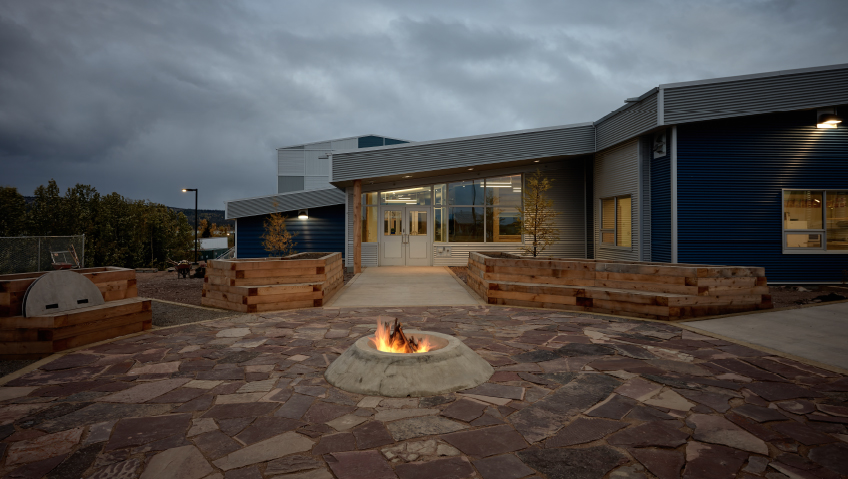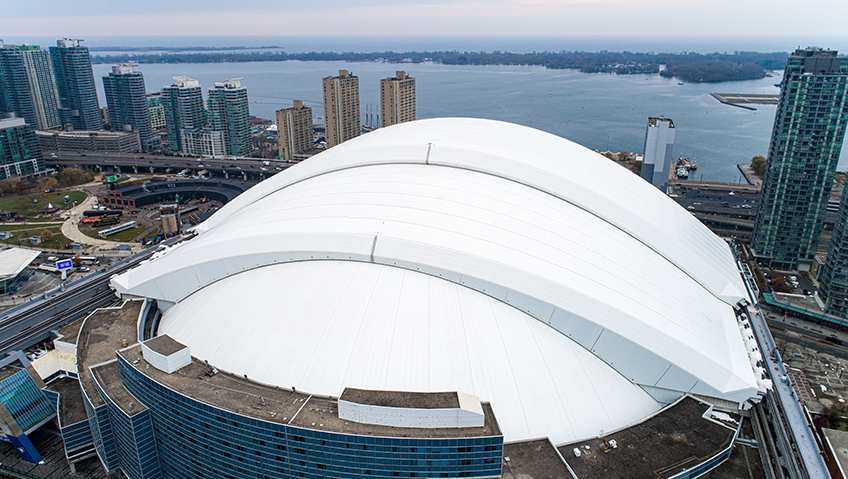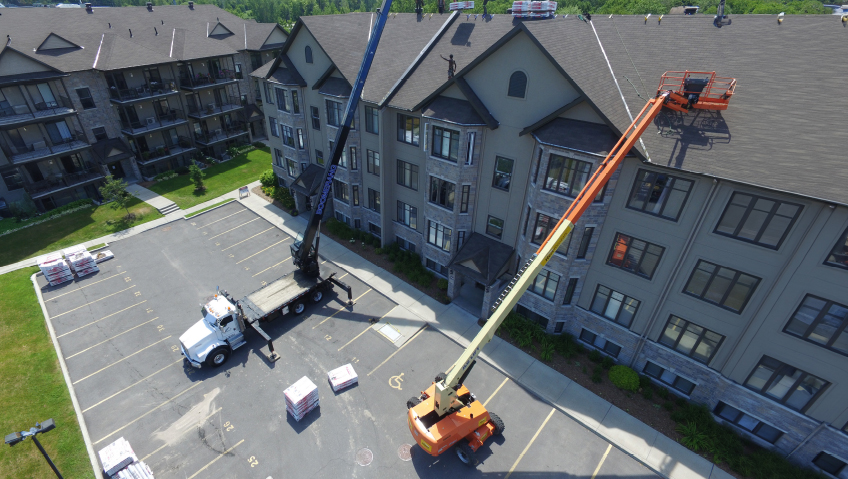ARCAN Construction Ltd. offers a true breadth of services: general contracting, mould/lead/asbestos abatement, insurance claim restorations, modular construction, design-build, architectural design, and wall/roof/building envelope work for the residential, commercial, infrastructure, and industrial sectors.
It is a fairly typical suite of construction services and markets, except that the company performs these duties in Canada’s Far North, the coldest, most sparsely populated part of the country. Consisting of the Northwest Territories, Nunavut, and Yukon territories, the Far North boasts fewer than 120,000 residents spread out over roughly 3.8 million square kilometres.
With offices in Yellowknife and Hay River, Northwest Territories, ARCAN’s reach extends “north to Alert and from the Yukon to the tips of Baffin Island. We’ve even looked at projects in Greenland,” says Vice President of Design, Caelin Cameron.
True North
Alert is a very isolated military base located on the northern tip of Ellesmere Island, close to the North Pole. The largest island in Canada, Baffin Island, Nunavut, has barely 13,000 residents and temperatures that can dip to -50 Celsius in winter. Yukon territory is famous for the 1890s Gold Rush and inhospitable weather.
“Without a doubt, logistics is our biggest challenge: access, transportation, weather, and a very shortened construction season. The North is a very big area with a very small population,” Cameron states.
Some Far North communities lack access roads and can only be reached by air or water and in addition, staffing is a significant challenge. “As in the rest of Canada it seems, there’s not a lot of local labour available in a lot of communities so it’s important for us to provide training and employment incentives as much as we can,” he says. In part to alleviate labour shortages and partly to build ties in small communities, ARCAN tries to hire local Indigenous workers whenever possible.
“All communities in the North have significant Indigenous populations. It’s different than in the south; communities are often quite small, less than 1,000 people. We love the opportunities to employ and involve locals in every community we work in. We’re a northern company after all, and we’re working to [grow] in our own backyard, so it’s something we’re passionate about,” explains Cameron.
Unsurprisingly, ARCAN excels at “keeping people warm while working in the coldest environments in Canada,” as the company puts it. Weatherproofing a building in the Far North starts with using well-trained crews and high-end materials, says Cameron. The company recommends that clients invest in something called “the perfect wall”—a cutting-edge method of keeping interiors warm, dry, and airtight.
“You’re taking the insulation as well as the vapour barrier and trying to push that to the exterior of the structure,” Cameron explains. “This limits perforations within your vapour barrier, creating a much better airtight seal around your building. It also pushes the insulation to the exterior of the structure so that thermal penetration through a wall or roof system is also mitigated.”
Making its mark
ARCAN is proud to be the only general contractor in the Far North with registered architects on staff, a distinction that helps the firm stand out. Some of the company’s more high-profile projects include a fish processing facility in Hay River and a seniors’ housing facility in Yellowknife, on which the company worked with Indigenous partners. “It’s a big, big renovation. It’s pretty much a full gut of an existing building then reconstruction in partnership with the Det’on Cho [Group of Companies].”
There are two main ways that the company lands work. The first is through straight tender, where “the tender is released by a client or government group. The design is typically already completed, and we just bid the project against other contractors. Depending on the scoring system, it’s usually the lowest cost that wins,” explains Cameron.
Then, there are two forms of design-build projects, those that involve a request for proposal and those that do not. In the first scenario, the outlines of the project already exist, so ARCAN submits a proposal including pricing, design, and other factors required by the proposal. Lastly, design-builds that aren’t responding to a request for proposal are usually instigated by private clients, the company works with the customer to develop the building concept, budget, and design. In general, territorial governments are the firm’s biggest clients.
Building the team
ARCAN Construction Ltd. was originally founded in Hay River, Northwest Territories in 1995 by Duncan Cooke. “He was a good businessman,” Cameron recalls. “He started the company as a general contractor with a truck and ladder in Hay River. He was able to build it up to what is now one of the largest—if not the largest—northern construction companies that is a true northern construction company.”
The firm initially focused on roofing and cladding, and over the decades, the company amalgamated with other businesses, added services—becoming registered to practice architecture in 2010—and underwent name changes. In January 2023, after combining various disparate companies that were run under a single corporate banner in a drive to get back to its roots under new President Aaron Doyle, the company rebranded as ARCAN Construction, a name it had used in the past.
In addition to its Yellowknife headquarters, it maintains a branch in Hay River and an administrative office in Okotoks, Alberta. All told, it has 25 salaried employees and 100 full-time site crew personnel who receive hourly wages.
Beyond basic construction-related skills, potential new hires must “have a good attitude. You’re going to be working long hours and be away from home for a long time,” says Cameron. Crews typically work on rotational shifts in ARCAN’s western markets—that is, a number of days or weeks on a job site in a community, then a number of days back at home. The number of days varies per project and location.
Facing down COVID
Understandably, COVID-19 had a dramatic impact on the company’s work schedules and general operations. Pandemic regulations on businesses were particularly strict in the Far North, where communities are widely dispersed, medical centers few and far between, and the population often skews toward the very young and very old. Because of this, ARCAN implemented a rigorous testing and quarantine regime for its field staff.
“Especially in Nunavut, our crews would quarantine for up to two weeks in a hotel at an airport before flying in. They would have to spend two weeks of their rotation sitting in quarantine, and then usually on their way back, they would also have to sit in quarantine before they were able to be back with their family. It was very challenging,” Cameron remembers.
Nunavut was already “the most challenging of the three territories,” he explains. “It’s boat and air access only to all the communities. There’s no road access, so materials have to be shipped in advance by boat. You get one or maybe two boats a year—if you’re lucky—to some of these communities, and air transport is cost-prohibitive when it comes to construction and sending in materials.”
COVID also wreaked havoc on ARCAN’s supply chain, as it did with all construction companies. Due to rising prices, the company pulled out of Nunavut, although it plans to return for the appropriate opportunities.
The company’s comprehensive COVID response reflected its commitment to health and safety. New hires go through intensive safety training and field crews undergo daily safety meetings. The team has a safety manager who runs the company’s safety programs and travels to sites to check conditions and conduct further training, and in addition to annual internal safety audits, the company is inspected by external Certificate of Recognition (COR) auditors every three years. The COR program is an occupational health and safety accreditation initiative organized by the Canadian Federation of Construction Safety Associations.
Rising to the housing challenge
In 2022, ARCAN teamed with the Hay River Métis Government Council to create METCAN Building Solutions Inc. (MBS) to design and build ready-to-move, modular structures which are then shipped around the north.
MBS was founded to address the Far North’s critical housing shortage. The company felt that “quick turnaround housing, like a ready-to-move or modular solution [would] be very profitable in the North. The climate-controlled manufacturing facility extends the shorter construction period, allowing production to continue through the winter months when typically construction halts until warmer weather allows. Hay River is a hub community, so we turned to our friends there at the Hay River Métis and put together a corporation with them. They are the majority owner but ARCAN brings in its expertise in architecture and construction,” explains Cameron.
Looking five years ahead, he forecasts the following: “I think we will have a better-established facility with MBS and a constant [stream] of ready-to-move structures coming out of that facility, operating year-round. I see expanded partnerships with First Nation groups, and First Nation development corporations providing more design-build opportunities… We have some exciting prospects on the horizon that could result in some nice expansion at all three offices.”






